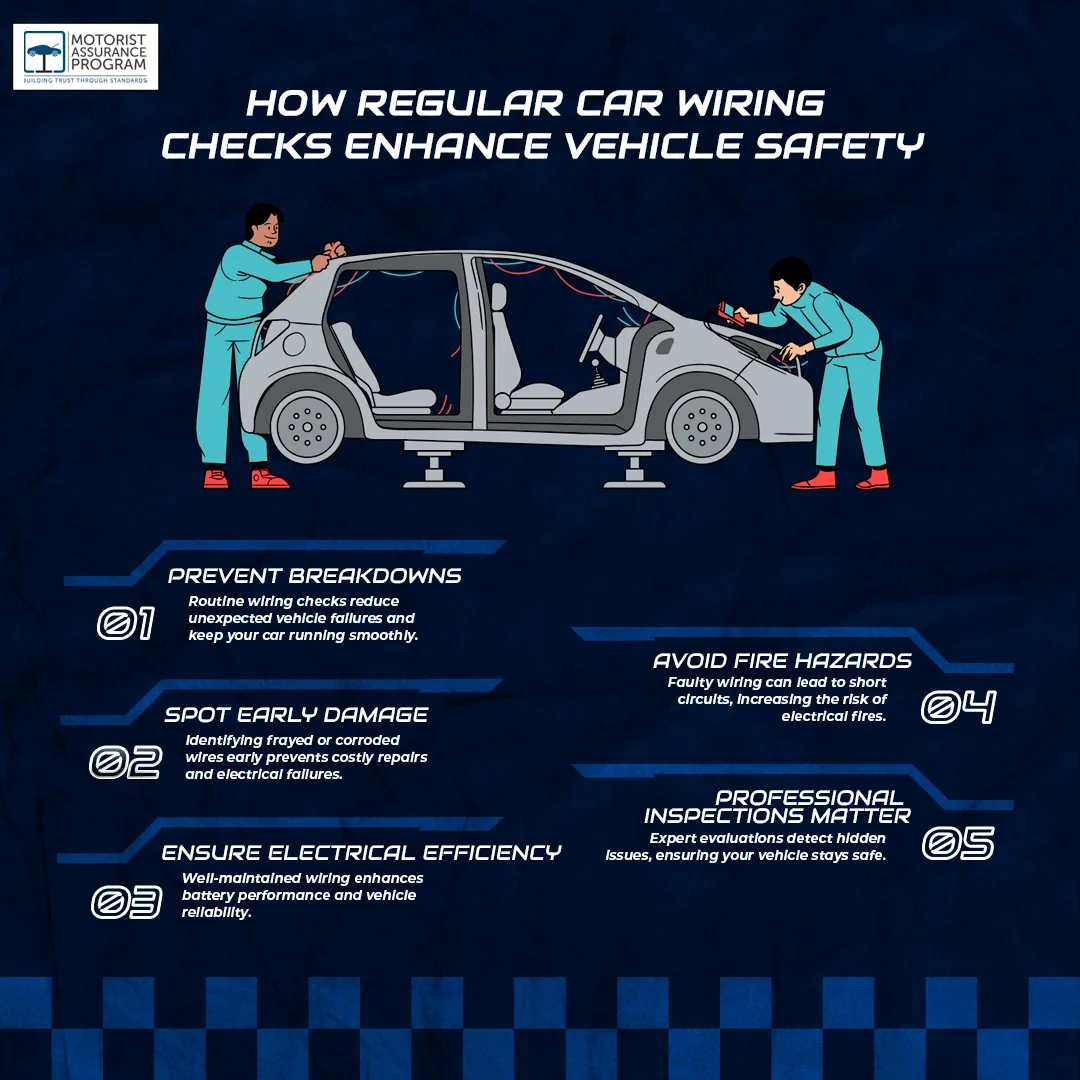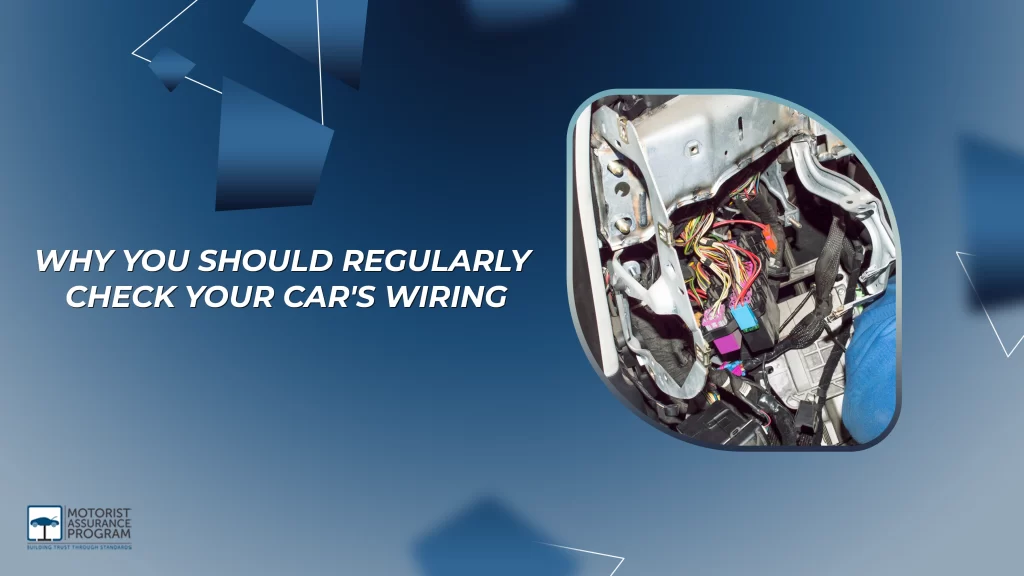Regularly checking your car’s wiring is essential for keeping your vehicle safe and reliable. Worn or damaged wiring can lead to costly repairs, electrical failures, or even fire hazards. By inspecting for frays, corrosion, or exposed wires, you can prevent unexpected breakdowns and maintain ideal vehicle performance. Plus, ensuring your wiring is intact supports the overall health of your car’s electrical system. There’s much more to take into account to keep your vehicle in top shape.

Key Takeaways
- Regular checks of your car’s wiring can prevent unexpected breakdowns and enhance overall vehicle reliability.
- Inspecting for fraying or cracks in insulation helps identify potential shorts before they escalate into major issues.
- Corrosion on connectors and wires can hinder electrical flow, so addressing it early improves system efficiency.
- Maintaining wiring integrity protects critical components, reducing the risk of costly repairs and electrical fires.
- Professional inspections provide thorough assessments, ensuring your vehicle’s electrical system operates safely and effectively.
Understand the Importance of Your Car’s Electrical System
Your car’s electrical system is the heartbeat of its performance, powering everything from the ignition to the lights. If it’s not functioning properly, you could face significant issues. Understanding how to check electrical wiring in your car is essential for maintaining your vehicle’s overall health. Start by inspecting the wiring for any visible signs of wear or damage, like fraying or corrosion. Use a multimeter to test for continuity and verify connections are secure. Remember, even a small issue can lead to larger problems, impacting your car’s reliability. Regular checks can save you from unexpected breakdowns and costly repairs. Keeping your electrical system in top shape will keep your car running smoothly and enhance your driving experience.
Battery Care – The Heart of the Electrical System
While the electrical system powers various components of your car, the battery serves as its heart, providing the necessary energy to start the engine and run electrical accessories. Proper battery care is essential for maintaining your vehicle’s performance and reliability. Start by regularly checking the battery terminals for corrosion, as any buildup can hinder power flow. Confirm the connections are tight and clean. Additionally, test the battery’s voltage periodically to catch any potential issues early. If your battery’s performance seems weak, consider having it professionally tested. Remember, a well-maintained battery not only enhances your car’s efficiency but also extends its lifespan, saving you from unexpected breakdowns and costly replacements. So, prioritize battery care to keep your car running smoothly.
Pay Attention to Fuses
Although they may seem small and insignificant, fuses play a critical role in your vehicle’s electrical system. When you’re conducting a car wiring check, it’s important to pay attention to fuses. They protect your electrical components from damage and can save you costly repairs down the line. Here’s why you should care:
Fuses are vital to your vehicle’s electrical system, safeguarding components and preventing costly repairs.
- Preventing Short Circuits: Fuses blow before wires can get damaged.
- Maintaining Functionality: They guarantee your lights and systems work when you need them.
- Avoiding Electrical Fires: Fuses help to prevent dangerous situations.
- Cost-Efficiency: Replacing a fuse is far cheaper than replacing entire wiring systems.
Regularly checking your fuses can keep your vehicle running safely and smoothly, so don’t overlook this important aspect!
Keep Terminals and Connectors Clean
Keeping terminals and connectors clean is essential for maintaining a reliable electrical system in your vehicle. Dirt, corrosion, and moisture can hinder electrical flow, leading to performance issues. Regularly inspect these components to guarantee they’re free from debris. When you’re learning how to check the wiring in a car, start by disconnecting the battery for safety. Then, use a wire brush or a cloth to clean the terminals gently, guaranteeing they’re not damaged. If you notice corrosion, a mixture of baking soda and water can help remove it effectively. After cleaning, apply a protective spray to prevent future buildup. By keeping terminals and connectors clean, you’ll enhance your car’s electrical reliability and longevity.
Maintain Wiring and Insulation
After confirming your terminals and connectors are clean, it’s important to turn your attention to the wiring and insulation throughout your vehicle. Regular checks can prevent costly issues down the road. Here’s how to check for bad wiring in a car:
Regularly check your vehicle’s wiring and insulation to prevent costly issues and ensure your safety on the road.
- Look for fraying or cracks** in the insulation.
- Inspect for corrosion** on connectors and wires.
- Check for exposed wires** that could cause shorts.
- Test with a multimeter** to identify faulty circuits.
Taking these steps not only enhances your vehicle’s performance but also confirms your safety. Ignoring wiring issues could lead to breakdowns or worse. So, don’t wait—make wiring maintenance a priority!
Mind the Alternator
The alternator is an important component of your vehicle’s electrical system, responsible for charging the battery and powering the electrical systems while the engine runs. When you’re checking car wiring, don’t overlook the alternator’s connections and condition. A faulty alternator can lead to poor performance, leaving your battery undercharged and your electrical systems struggling. Regular inspection of the wiring connected to the alternator can prevent issues like frayed wires or loose connections. If you notice any signs of wear, it’s vital to address them promptly. Keeping an eye on the alternator and its wiring guarantees your vehicle runs smoothly and maintains electrical reliability. So, make checking car wiring a routine part of your maintenance schedule.
Keep an Eye on Warning Lights
When monitoring your vehicle’s performance, paying attention to warning lights is just as important as checking the alternator and its wiring. Ignoring these signals can lead to serious issues down the line. Here are four warning lights you shouldn’t overlook:
- Battery Light: Indicates potential wiring issues or battery failure.
- Check Engine Light: Signals a range of problems, possibly involving wiring.
- Oil Pressure Light: Warns of low oil levels or wiring malfunctions affecting the oil system.
- Brake Warning Light: Could indicate serious brake issues linked to wiring checks.
Regularly monitoring these warning lights can help you catch problems early, ensuring your car runs smoothly and safely. Don’t wait until it’s too late—stay vigilant!
Periodic Professional Inspections
While you might be diligent about checking your car’s wiring and other components, scheduling periodic professional inspections is equally crucial. These inspections allow trained technicians to identify issues you might overlook, ensuring your vehicle operates safely. They’ll check the integrity of your wiring, looking for frays or corrosion that could lead to bigger problems down the road.
Moreover, periodic professional inspections give you peace of mind, knowing experts are monitoring your car’s overall health. They can also provide valuable insight into any necessary repairs or maintenance. By investing in these inspections, you’re not just maintaining your car; you’re also protecting your investment and enhancing your safety on the road. Don’t skip this critical step in your car care routine!
Understand the Role of Sensors
Sensors play an essential role in modern car wiring systems, ensuring your vehicle runs smoothly and efficiently. These devices monitor critical functions and communicate issues before they escalate. Regular car check-ups help identify sensor problems, preventing costly repairs and enhancing safety.
Sensors are vital for your car’s performance, monitoring key functions and preventing costly repairs through regular check-ups.
Consider these key roles of sensors:
- Engine Performance: They optimize fuel efficiency and reduce emissions.
- Safety Features: They control airbags and stability systems, ensuring your safety.
- Diagnostics: They provide real-time data, alerting you to potential issues.
- Comfort: They regulate climate control, enhancing your driving experience.
Frequently Asked Questions
How Often Should I Check My Car’s Wiring?
You should check your car’s wiring at least twice a year or whenever you notice electrical issues. Regular inspections help prevent bigger problems, ensuring your vehicle runs smoothly and keeps you safe on the road.
What Are the Signs of Damaged Wiring?
Damaged wiring can be like a frayed rope, compromising strength. Signs include flickering lights, unusual smells, or electrical shorts. If you notice these, it’s essential to investigate further before issues escalate into more significant problems.
Can I Repair Wiring Issues Myself?
You can repair wiring issues yourself if you have the right tools and knowledge. Just be cautious—if you’re unsure or the damage is extensive, it’s best to consult a professional for safety and reliability.
What Tools Do I Need to Inspect Wiring?
To inspect wiring, you’ll need a few essential tools: a multimeter for checking voltage and continuity, wire strippers for removing insulation, and electrical tape for securing connections. Safety goggles are also a smart addition.
How Do Weather Affect Car Wiring?
Did you know that over 60% of car electrical issues stem from weather damage? Rain, snow, and extreme temperatures can cause wiring corrosion, leading to shorts or failures. Keeping an eye on wiring helps prevent these problems.
Conclusion
To sum up, regularly checking your car’s wiring isn’t just about maintenance; it’s about ensuring your safety on the road. After all, wouldn’t you rather catch a small issue before it turns into a big problem? By staying proactive with your vehicle’s electrical system, you’ll enhance its reliability and performance. Regularly checking your vehicle’s electrical connections should be a top concern—your car and your mental well-being will appreciate the effort.


